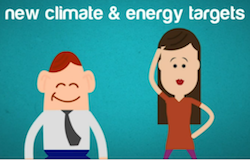Italy has passed a law that will set the way for national binding targets. The news comes on the heels of talks by the European Union (EU) on what, if any, binding renewable energy targets should be in place. The official degree as published in the “Gazzetta Ufficiale” states that fuel suppliers will be obligated to blend fuel:
- at least 0.6% advanced biofuels in petrol and diesel beginning January 1, 2018;
- 0.8% beginning January 1, 2020; and
- 1% beginning January 1, 2022.
The passage of Italy’s law comes at the same time the European Council released its 2030 Energy and Climate Package where the transportation sector has seen the most positive changes when compared to the first proposal. The law now puts Italy as the lead in Europe on mandating advanced biofuels from waste and residues.
The Italian decree comes six months after the Italian Ministry of Economic Development announced in May the intention to fund the construction of three advanced biofuels  facilities in Southern Italy and is part of the country’s initiatives to boost competitiveness.
facilities in Southern Italy and is part of the country’s initiatives to boost competitiveness.
In the fall of 2013, Novozymes, together with Italian company Biochemtex opened the world’s first commercial-scale advanced biofuels refinery in Italy – using agricultural waste as input. When asked by DomesticFuel what message Italy’s mandate sends to other countries, Novozymes’ Vice President for Biomass Conversion, Sebastian Søderberg answered, “In general, it will send a very positive signal to the other European countries and outside Europe. Italy and a number of other member states have been pushing for a mandate for advanced biofuels at EU level for more than 2 years and Italy’s move will support this process.”
With the EU foundering on its commitment to renewable energy, Søderberg noted that the new Italian mandate could encourage the EU Parliament and the EU Council to cooperate to, “adopt an ambitious, EU-wide mandate for advance biofuels by 2020 and beyond.”
 In the U.S. in particular, private investments have dried up, especially with the uncertainty around the Renewable Fuel Standard (RFS). Søderberg believes, however, that this new Italian mandate gives the right signal to investors. “The Italian decree clearly demonstrates a rapid growing confidence in the ability of the advanced biofuels industry to become an engine for economic growth and job creation, rural development and climate change mitigation,” he said.
In the U.S. in particular, private investments have dried up, especially with the uncertainty around the Renewable Fuel Standard (RFS). Søderberg believes, however, that this new Italian mandate gives the right signal to investors. “The Italian decree clearly demonstrates a rapid growing confidence in the ability of the advanced biofuels industry to become an engine for economic growth and job creation, rural development and climate change mitigation,” he said.
As advanced biofuels continue to gain momentum, DF asked Søderberg what the next steps were for Novozymes. “Overall, Novozymes will continue our dedicated efforts with our partners around the globe, including our Italian partner Beta Renewables, ensuring that our biotech solutions will help accelerate industry commercialization as well as continuous improved profitability of the plants.”
“The Italian decree will increase the demand for cellulosic ethanol by creating a market with predictable demand,” he added. “If produced with enzymes from Novozymes, this will be a new source of revenue. However, it is still too early to say how Italy will source the biofuels and which technology providers stand to benefit, but the overall increase in demand is positive.”

